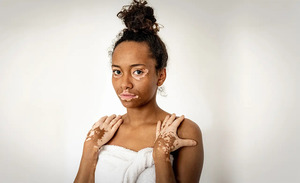Vitiligo And Skin Cancer Risk: What You Need To Know? - Kayakalp Global
Body

External treatments containing Psorlia, aloe, black pepper, and other herbs have been developed by Kayakalp Global to work twice as fast as babchi alone. Kayakalp Global has devised a long-term treatment approach to ensure that the condition does not recur after complete recovery. KayaKalp Global offers the Best Team of Experts in Delhi, India for Vitiligo and Skin Cancer Risk Treatment. If you have any further questions, please contact us at +91–9599794433 for a free consultation.
Vitiligo Or Leucoderma
Vitiligo and leucoderma are both skin disorders characterized by the loss of skin color, resulting in white patches on the skin. However, there are some differences between the two terms.
Vitiligo is a chronic skin condition that occurs when the cells responsible for producing melanin, the pigment that gives color to the skin, die or stop functioning. As a result, white patches of varying sizes appear on different parts of the body. The exact cause of vitiligo is not known, but it is believed to involve a combination of genetic, autoimmune, and environmental factors. Vitiligo can affect people of all races and both sexes, and it is not contagious.
Can Vitiligo Cause Cancer?
Vitiligo itself does not directly cause cancer. Vitiligo is a disorder that affects the pigmentation of the skin, resulting in white patches. It is not considered a malignant or cancerous condition.
However, there may be a slightly increased risk of developing certain types of skin cancer for individuals with vitiligo. The areas of skin affected by vitiligo have a reduced amount of melanin, which provides some protection against harmful ultraviolet (UV) radiation from the sun.
Skin Cancer Symptoms
Skin cancer can manifest in various forms, and the symptoms can vary depending on the type of skin cancer. Here are some common signs and symptoms associated with skin cancer:
Changes in the appearance of the skin: Look out for new moles, growths, or patches on your skin, or any existing moles that have changed in size, shape, color, or texture.
Irregular borders: Skin cancer lesions often have uneven or irregular borders that may appear scalloped, notched, or poorly defined.
Color changes: Pay attention to moles or growths that exhibit multiple colors or an uneven distribution of color, including shades of brown, black, red, white, or blue.
Size: Watch for any new growths on your skin that are larger than 6 millimeters (about the size of a pencil eraser).
Texture changes: Skin cancer lesions may have a rough, scaly, or crusty texture. They may also become raised, bumpy, or develop a warty appearance.
Ulceration or bleeding: Any mole or lesion that bleeds without any apparent cause or fails to heal may indicate skin cancer.
Itching or pain: Some skin cancers can be accompanied by itching or pain in the affected area.
It’s important to note that these symptoms can also be caused by benign conditions, so it is always advisable to consult a healthcare professional for a proper evaluation and diagnosis if you notice any concerning changes on your skin. Additionally, regular self-examinations and routine skin checks with a dermatologist are recommended to detect any potential skin cancer at an early stage.









Comments